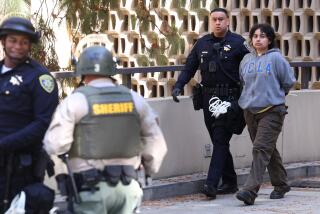Scores arrested as Syrian forces seek to crush protests
Reporting from Beirut — A massive crackdown by Syrian security forces continued Monday as troops with armored vehicles flooded cities and towns, sweeping up scores of activists in what critics are calling arbitrary arrests and shooting others dead in the streets.
But activists vow that the repression will to fail to halt their peaceful pro-democracy movement, inspired by revolutions this year in Egypt and Tunisia.
“The situation is very difficult for sure,” said one activist reached Monday in Damascus, whose name is being withheld for security reasons. “The authorities face the people with tanks and gunfire and a massive arrest campaign and torture. You should be very brave to go on in such circumstances. But the Syrians will go out and protest in the coming days.”
Armored security forces poured into the cities of Baniyas and Homs on Monday as well as the Damascus suburb of Moadamyeh. Activists say hundreds were arrested and dozens killed over the weekend as the army claimed it was hunting armed terrorists it said had infiltrated the country.
Nearly 1,000 people were arrested over the weekend and 30 were killed in house-to-house raids, in addition to dozens killed during protests after Friday prayers, human rights activists said.
They say that as many as 10,000 people have been arrested since protests against President Bashar Assad began seven weeks ago. Tanks also rolled into the towns of Tafas and Dael near Dara, the southern community where the protests began over the arrest and alleged torture of a group of teenagers accused of writing political graffiti.
The autocratic Assad, whose family has ruled Syria for more than five decades, denies engaging in a systematic campaign of violence against its citizens.
“The government’s orientation is to contain the crisis and avoid violence, for it often happens that innocent, uninvolved people fall as victims, and this is what has actually happened in some areas,” Assad was quoted as saying by the television station Al Manar, run by Syria’s Lebanese ally, Hezbollah.
But activists say the Syrian military is engaged in a massive campaign of arrests, the random use of brute force and efforts to rein in national institutions and restrict communications abroad in a largely futile attempt to limit growing international outrage.
Syrian army and security forces continued operations in various towns in and around Dara, a Syrian military source said over the weekend, despite the government’s claims that it had mopped up the few alleged militant cells they blamed for the unrest there.
“The army never withdrew from Dara,” said the military source, speaking on condition of anonymity. “To the contrary, military reinforcements are arriving. Some tanks were just taken out of Dara in order to be used in other cities and towns.”
Despite government claims that militant outsiders are fueling the protests, a Syrian military source reported that almost no one arrested has been armed.
“We have no evidence that there are outside militants,” echoed a Western diplomat in Beirut, speaking on condition of anonymity. “From what we can tell, it’s an indigenous movement.”
Many activists find themselves on the run or holed up at home. “Anyone whom the security officials even suspect is arrested,” said a Damascus activist, a writer and social scientist who asked that his name not be published. He said he hadn’t changed his clothes in a week, moving from couch to couch at friends’ apartments. “Even if you are released you know it’s a matter of time before you are arrested again.”
Another activist said his leg was broken in a beating by security officials during a protest. He was then arrested, interrogated and released. “The investigations are barbaric,” he said. “They treat citizens as if they are criminals and traitors working for America and Israel.”
One woman arrested in Damascus for taking part in a women’s demonstration in support of detained protesters said she was treated relatively well, but saw men in the facility being beaten and heard them crying out in agony.
“We stayed in a cell for two nights and were made to sleep on the floor without blankets or mattresses in a prison for internal security,” she said of the Baghdad Street facility. “We laughed at times and cried at others. We did not know what would happen to us or when we would be free.”
After three days of imprisonment, the woman was quickly tried and released, but only after denying any involvement in the protests. Before she left the detention facility, security officials had a final request.
“They also asked me to tell the world how nice they were to me, and how humane their treatment was,” she said.
Religious leaders say they also have been advised to avoid negative statements against the Assad government.
A cleric said that the Syrian head of the intelligence, Ali Mamluk, gathered 700 religious scholars last week and asked them to avoid referring to recent events in their Friday sermons. The cleric, who spoke on condition of anonymity because of fears of retribution, said that Mamluk asked them to side with the state, saying there were “many surprises” for the Syrian people in the coming days.
Mamluk vowed to the clerics that authorities would shutter any mosque from which protests pour out after Friday prayers with the excuse of renovating them.
But the regime’s security strategy may not be working. As protests have been quelled in besieged cities such as Dara, they have erupted in other nearby towns. Meanwhile more and more cities are becoming bastions of rebellion, including Deir Alzour and Qamishli in the country’s east.
“It seems like they have to have direct military presence, tanks and thousands of security officers to contain an area,” said Ammar Abdulhamid, a Syrian activist based in Washington. “Once they remove these, the people are back in the streets; even just across the street there will be protests.”
Hajjar is a special correspondent. A special correspondent in Damascus also contributed to this report.
More to Read
Sign up for Essential California
The most important California stories and recommendations in your inbox every morning.
You may occasionally receive promotional content from the Los Angeles Times.










